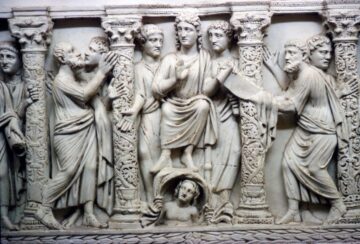Candida Moss in Time:
 It is an unlikely success story. A first century religious leader named Jesus was brutally executed as a criminal in first century Jerusalem. His death should have ended the movement. He left behind him a ragtag group of poorly educated Aramaic-speaking fishermen and craftsmen; men with some street smarts who lacked resources, experience, or connections. And yet, tradition insists, this handful of men seeded the religion that would change the world.
It is an unlikely success story. A first century religious leader named Jesus was brutally executed as a criminal in first century Jerusalem. His death should have ended the movement. He left behind him a ragtag group of poorly educated Aramaic-speaking fishermen and craftsmen; men with some street smarts who lacked resources, experience, or connections. And yet, tradition insists, this handful of men seeded the religion that would change the world.
The improbability of Christianity’s success has always been part of its rhetorical power; how could this small group of misfits have succeeded against such odds? There is a lengthy intellectual tradition that attempts to explain the expansion, rise, and spread of Christianity from its beginnings in the Galilee to its ‘conquest’ of the Roman Empire. At least part of the answer, though neglected, is simple: The disciples had help. An overlooked aspect of the famous Road to Damascus story is how dangerous it was. The Apostle Paul’s vision of Christ left him in a perilous situation: newly blind and stranded several miles away from sustenance and shelter. It was only with the assistance of those in his entourage that he made it into the city and avoided an unpleasant death from starvation and dehydration. These helpers are almost invisible in the story, but they are critical to Paul’s success.
The contributions of invisible assistants go much further than their underappreciated but essential roles as local guides and travelling companions.
More here.
